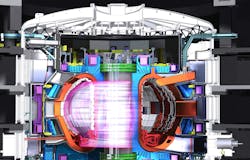Canadian partners aiming at Nuclear Fusion as future key to Decarbonization
Nuclear power, while hugely expensive relative to other electricity generation fuel resources, offers greater efficiencies and capacity factors than renewables in delivering carbon-free power for commercial, industrial and residential customers.
Fission—or splitting the nucleus of atoms of heavy elements to create power—is the way that today’s nuclear energy facilities generate power. But future nuclear fusion, if harnessed commercially, is seen as stronger and yet less radioactive means of helping utilities and industries meet decarbonization goals.
In Canada, three major players are partnering to try and accelerate the deliver of nuclear fusion power in that nation. Electricity generator Bruce Power, General Fusion and the Nuclear Innovation Institute have entered into a memorandum of understanding (MOU) to collaborate on these goals.
Together, the organizations will evaluate potential deployment of a fusion power plant in Ontario, including in the tri-county Clean Energy Frontier region of Bruce, Grey and Huron. The partners will build on existing clean energy technologies, skills, and expertise in the region to develop a go-forward strategy, according to Bruce Power, which owns and operates the 6.5-GW, 8-unit Bruce Generating Station along the shores of Lake Huron.
They will also lead stakeholder and public outreach activities to raise awareness of the transformative potential of powering Canadian homes, businesses, and industry with zero-carbon, reliable, and affordable fusion energy, according to the release.
“In order to achieve a net-zero future here in Ontario, and Canada, we need to continue expanding the clean electricity production of our existing facilities and will need innovation as part of the future,” Mike Rencheck, President and CEO, Bruce Power, said in a statement. “Our partnership will explore these innovations and leverage the established capability in this region as a home to new technologies that will contribute to a carbon-free future.”
EnergyTech's free and tri-weekly Newsletter delivers Insights into the C&I Energy Transition
British Columbia-based General Fusion is a global firm focused on fusion energy technology development. To confirm the performance and economics of its Magnetized Target Fusion (MTF) technology at a power-plant-relevant scale, General Fusion is building a Fusion Demonstration Plant, which is scheduled to be operational in 2025.
If successful, General Fusion plans to deliver zero-carbon nuclear fusion energy worldwide by the 2030s.
“This landmark MOU provides a framework in which Canada’s energy leaders can benefit from each other’s technology innovations and expertise to lead the way in adopting fusion power in Ontario and across Canada,” said Christofer Mowry, CEO, General Fusion. “We look forward to advancing this partnership to help meet Canada’s climate targets and the increasing electricity needs of Canadians.”
Fusion, which is the way the sun derives its energy, utilizes lighter elements like hydrogen and helium, but the energy intensity and efficiency is considered greater than fission. The challenges, however, are significant and include electrostatic barriers, among other things.
Many nuclear entities are researching fusion possibilities as the process is less radioactive than fission’s method involving uranium and other heavier components. Several nations are working together on the giant experimental International Thermonuclear Reactor project in France.
The United Kingdom has announced plans for a prototype nuclear fusion plant.
In the U.S., meanwhile, companies such as NuScale Power are exploring next-gen small modular reactors projects. Last year, the Idaho National Laboratory delivered a report on the potential for next-gen nuclear to be a resource of Net-Zero Microgrids.
About the Author
Rod Walton, EnergyTech Managing Editor
Managing Editor
For EnergyTech editorial inquiries, please contact Managing Editor Rod Walton at [email protected].
Rod Walton has spent 17 years covering the energy industry as a newspaper and trade journalist. He formerly was energy writer and business editor at the Tulsa World. Later, he spent six years covering the electricity power sector for Pennwell and Clarion Events. He joined Endeavor and EnergyTech in November 2021.
Walton earned his Bachelors degree in journalism from the University of Oklahoma. His career stops include the Moore American, Bartlesville Examiner-Enterprise, Wagoner Tribune and Tulsa World.
EnergyTech is focused on the mission critical and large-scale energy users and their sustainability and resiliency goals. These include the commercial and industrial sectors, as well as the military, universities, data centers and microgrids. The C&I sectors together account for close to 30 percent of greenhouse gas emissions in the U.S.
He was named Managing Editor for Microgrid Knowledge and EnergyTech starting July 1, 2023
Many large-scale energy users such as Fortune 500 companies, and mission-critical users such as military bases, universities, healthcare facilities, public safety and data centers, shifting their energy priorities to reach net-zero carbon goals within the coming decades. These include plans for renewable energy power purchase agreements, but also on-site resiliency projects such as microgrids, combined heat and power, rooftop solar, energy storage, digitalization and building efficiency upgrades.

